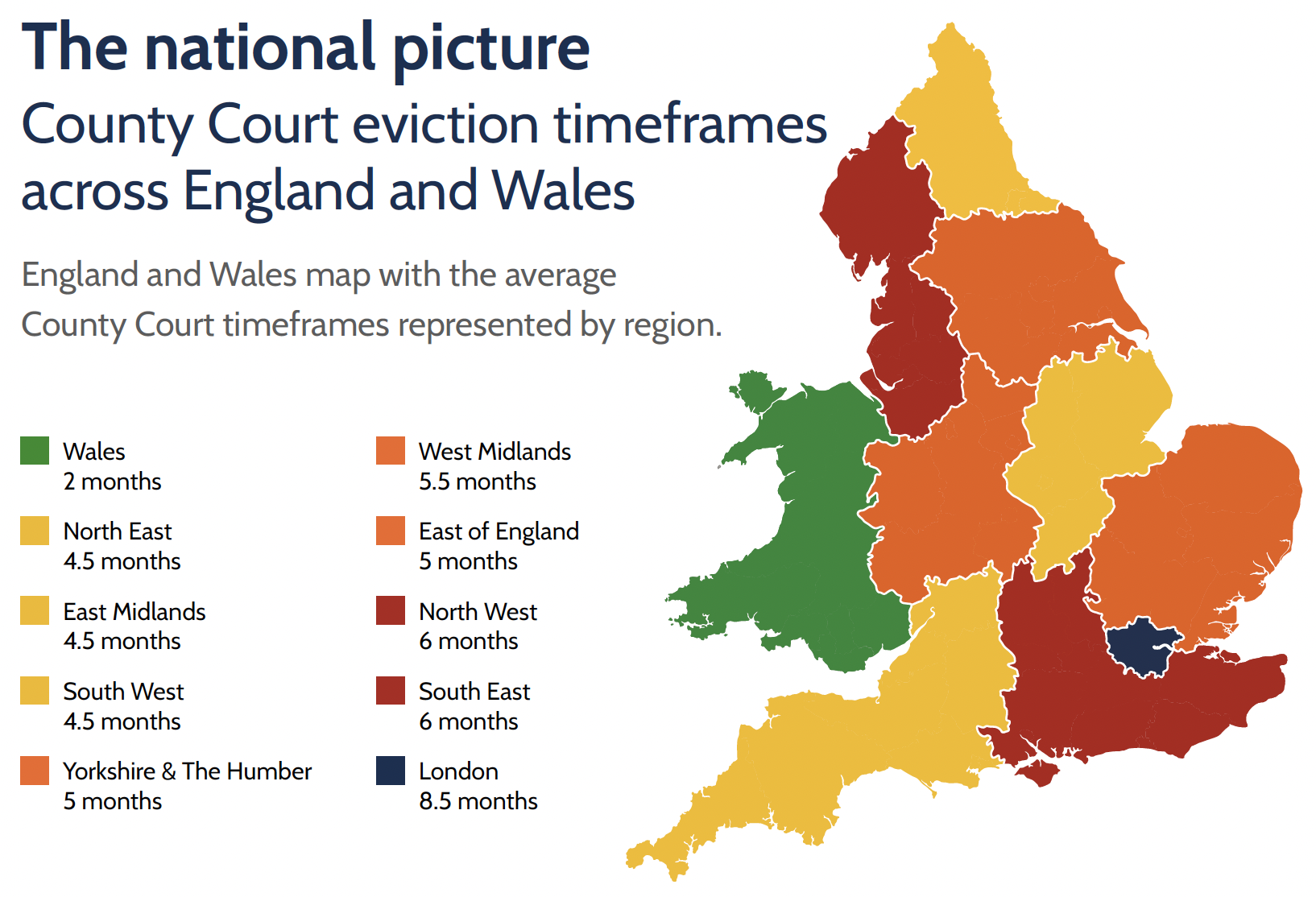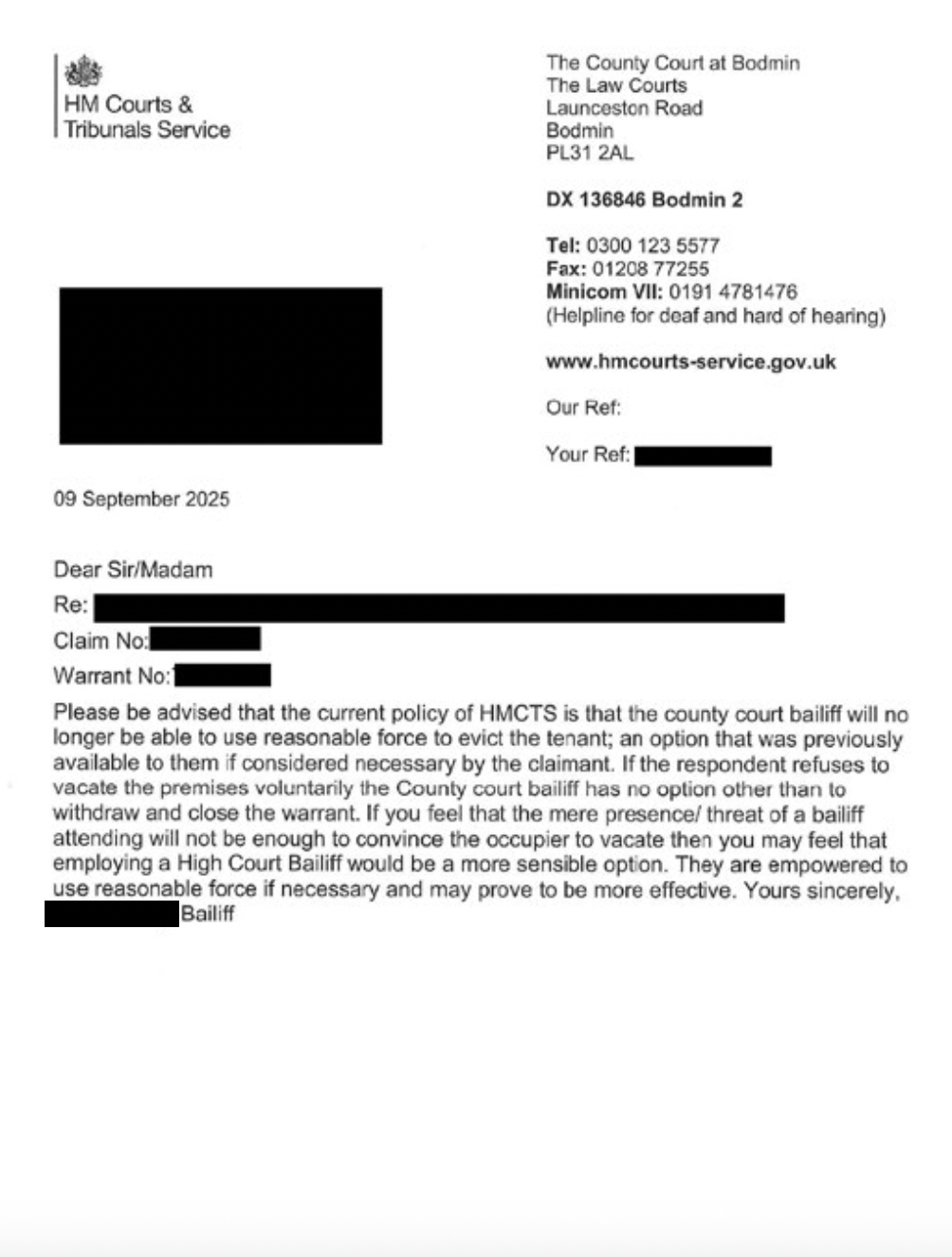Download the Possessions - Transferring Up report
This page summarises the findings of the Possessions – Transferring Up report published by the HCEOA in October 2025.
It looks at the experience of property professionals and landlords in England and Wales when trying to use the County Court and the High Court for enforcing possession orders (evictions). It shows the huge scale and impacts of the delays in the County Court Bailiff system.
The results are staggering. You can view the key findings below or find out more about how transferring up could save landlords months of delay and thousands of pounds in lost rent.
Simple Government action could make a difference today
London is experiencing the worst delays
Delays have an impact across society
Policy changes and poor communication add to uncertainty
Headline findings
Using the High Court Enforcement route the average saving per property in London could be around £12,000 even once High Court fees are taken into account.
- £12,708 – national average unpaid rent per property at the time of eviction
- £19,223 – London average unpaid rent per property at the time of eviction
- 6 months – national average waiting time for an eviction in the County Court after a judge has ruled the tenant should be evicted
- 8 months – London average waiting time for an eviction in the County Court after a judge has ruled the tenant should be evicted
By contrast, High Court Enforcement Officers can arrange an eviction date within a month of receiving a Writ.
Simple Government action could make a difference today
We’ve written to the Minister and senior civil servants to urge Government to recognise the scale of the problem and make two urgent changes to help ensure fair and timely access to justice for landlords.
- Engage with District Judges to ensure that requests to transfer up to the High Court for enforcement should always be allowed where the County Court Bailiff delay locally is three months or more or where it is possible that reasonable force may have to be used.
- Simplify the process for ‘transferring up’ so that it’s easier for landlords to request and apply, easier for the County Court to administrate and better for onboarding into future digital reforms of the courts. This could be done by removing the need for Section 42 and using the N293a process.
Both changes will speed up the system and enable quicker access to justice in cases wherea judge has already granted a Possession Order.
London is experiencing the worst delays
Whilst the national picture varies according to region, the research clearly identifies London as the epicentre of all delays.
- 8 months – average waiting time for a County Court Bailiff eviction date after an Order for Possession has been granted by a judge
- £19,223 – average reported unpaid rent at the time of eviction
- 2 out of 10 – average satisfaction rating for the County Court process in London
As a result, landlords in London in particular are being urged to apply for leave to transfer the possession to the High Court for enforcement at the same time as they request an Order for Possession and to ensure they give substantial evidence detailing the grounds for transferring the case in a witness statement supporting the application.
Using the average London rental figures and delays reported in the survey, the HCEOA has calculated that landlords could reduce their losses by over £12,000 per property by switching to the High Court enforcement route in the capital.

*Based on London average rent of £2,178 from survey respondents and a £130 County Court fee
**Based on two months lost rent at the London average figure plus a £78 writ fee and a £1,000 enforcement fee allowance
National picture is varied
The map shows how the scale of delays varies widely by region. London has by far the biggest delays, the impacts of which are exacerbated as average rents in London are around 25% higher than anywhere else in the country.

It indicates that in areas like Wales, the County Court system is still likely to be the best option for landlords as the delays are relatively small.
Delays have an impact across society
As the County Court eviction delays affect private landlords, local authorities and social housing providers trying to take control of their properties there is an impact right across the housing sector:
- Eviction delays limit the availability of social and private rental properties for new tenants
- Local authorities and social housing providers are spending valuable time and resources chasing up County Courts to try and secure eviction dates
- Delays are adding to the frustrations and costs faced by responsible private landlords who are operating within the legal framework, with many now saying they will exit the market
- Delays add to the outstanding debts faced by tenants, worsening their long-term financial situation
Strong protection for tenants would still be in place as this transferring up process can only take place after a judge has ruled that the tenant should be evicted. HCEOs carry out evictions under the same rules as County Court Bailiffs, and their fees are paid for by the claimant and not the tenant.
Policy changes and poor communication add to uncertainty
At least one County Court is now quoting HMCTS policy as stating that “the county court bailiff will no longer be able to use reasonable force to evict the tenant” where necessary and recommending the use of High Court enforcement if appropriate. This new policy will inevitably cause further delays.

Landlords often also face a challenge in contacting County Court Bailiffs to enquire about waiting times or the progress of cases. Many of our research respondents highlighted this as a real challenge, particularly in London.
Our research identified busy central phone lines with long waiting lists and complex auto-reply emails being sent to landlords as being a key part of the challenge for them.
The image below shows the first three paragraphs of a 717-word auto response email being issued to landlords enquiring about possessions to

Read our full Possessions - Transferring Up research findings
Useful links
I need advice on recovering possession of my house or land
News release: Possessions Transfer Up research findings published





